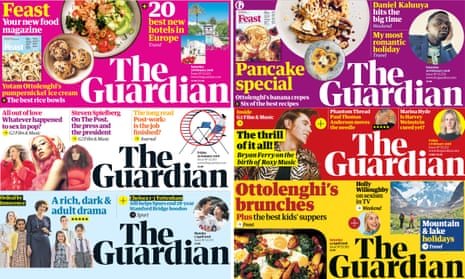The Guardian is the most trusted newspaper in Britain as well as being the most read quality news outlet, and the most popular quality news outlet among younger readers, according to industry figures released on Monday.
The Guardian is now reaching more than 23 million British adults every month, with the organisation’s articles being read by 12 million Britons in a typical week and 4.1 million on the average day, aided by the decision to keep the website free for all readers.
In addition, more than 97% of online readers think that reading the Guardian is time well spent, which is the highest score among all national publishers in the country. The figure rises to 99% among Guardian print readers.
Readers of the Guardian website were also substantially more likely to say that they felt a close connection to the outlet, that it offered them something they could not get elsewhere, and that they trusted its reporting. The Observer topped the equivalent rankings for Sunday newspapers.
“This fantastic set of results demonstrates the Guardian’s unique position in the media,” said the editor-in-chief, Katharine Viner. “We see consistently high scores for trust and engagement from both our digital and print readers, and it is excellent news that the Guardian resonates so strongly with younger audiences, too.”
The figures cover the period October 2017 to September 2018 and were produced by the Publishers Audience Measurement Company (PAMCo), which last year replaced the traditional National Readership Survey as the industry standard method of measuring the influence and reach of publications.
The Guardian topped almost every measure of trust and readership in the quality newsbrands category – a group including the Times, the Daily Telegraph, the Independent, and the i.
Among this group the Daily Telegraph has slipped to second place in terms of total audience size. The Independent is in third place, while the Times trails substantially far behind in fourth place, in part thanks to the decision to put its entire website behind a paywall. The i is a distant fifth.
The figures show a particular success among younger readers, with 8 million Britons under 35 reading the Guardian in a typical month – compared with just 1.8 million who read an article in the Times.
Including tabloid newspapers, the Guardian’s readership figures now trail only the Sun and the Daily Mail in terms of total British audience.
The industry figures also suggest news websites that relied heavily on attracting readers from Facebook and Google, rather than directly building a loyal audience who visit a website or app, have been hit hard in the last year as social networks refer less traffic in response to a series of scandals about online misinformation.
These changes appear to have especially hurt the Independent and the Daily Express, with all news outlets facing up to a difficult financial year ahead with no sign that the major social networks are planning to send more readers to websites.
Many media companies, including prominent online-only start-ups, are also struggling financially as a result.
The Guardian’s parent company recently announced that more than 1 million readers have made financial contributions to support the publication on an ongoing basis, as part of the plan to break even by April following years of heavy losses.
“Many readers didn’t understand the challenging commercial reality facing all news organisations, but once we told them more, they expressed real interest in wanting to support the Guardian,” Viner told the Society of Editors conference in Salford last month. “This was helped by the fact that any money made by the Guardian has to be spent on journalism, because of our ownership structure with no shareholders or owner.”
